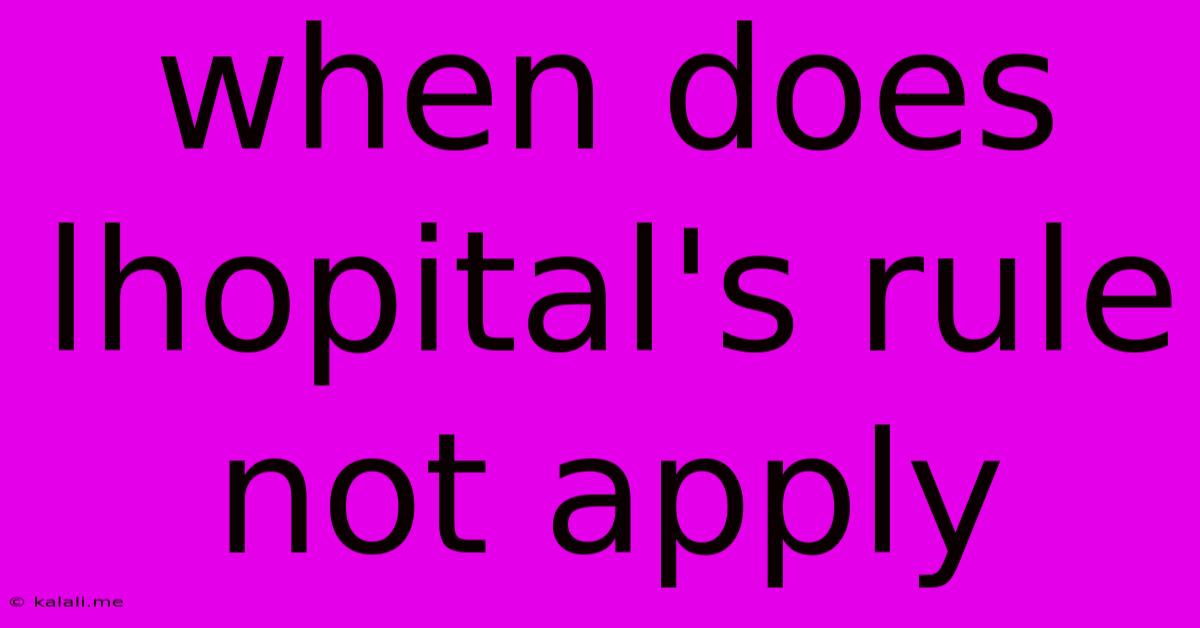When Does Lhopital's Rule Not Apply
Kalali
May 23, 2025 · 3 min read

Table of Contents
When L'Hôpital's Rule Doesn't Apply: Understanding its Limitations
L'Hôpital's Rule is a powerful tool in calculus for evaluating indeterminate forms like 0/0 and ∞/∞. It simplifies the process of finding limits by differentiating the numerator and denominator separately. However, its application isn't universal, and misusing it can lead to incorrect results. This article delves into the situations where L'Hôpital's Rule is inapplicable and offers alternative approaches to limit evaluation.
Understanding the Indeterminate Forms
Before discussing the limitations, let's briefly review the indeterminate forms where L'Hôpital's Rule can be applied:
- 0/0: The limit of the numerator and the limit of the denominator are both zero.
- ∞/∞: The limit of the numerator and the limit of the denominator are both infinity.
Other indeterminate forms, such as 0 * ∞, ∞ - ∞, 0⁰, 1⁰⁰, and ∞⁰, require manipulation before L'Hôpital's Rule can be considered – often by rewriting them into a 0/0 or ∞/∞ form.
When L'Hôpital's Rule Fails
L'Hôpital's Rule doesn't magically solve all limit problems. Here are key scenarios where it's inappropriate or ineffective:
1. The Limit is Not Indeterminate:
This is the most common mistake. L'Hôpital's Rule only applies to indeterminate forms. If the limit of the numerator or denominator is a finite non-zero number, while the other is zero or infinity, direct substitution or basic limit properties are sufficient. Applying L'Hôpital's Rule in this case will yield an incorrect result.
Example: lim (x→2) (x²+1)/(x-1). This is not an indeterminate form; direct substitution gives 5/1 = 5.
2. Repeated Application Leads to a Cycle:
Sometimes, repeatedly applying L'Hôpital's Rule leads to a cycle where you keep getting back to the original indeterminate form. In such cases, L'Hôpital's Rule is unhelpful, and alternative techniques are necessary.
3. The Derivatives Don't Exist:
L'Hôpital's Rule requires the existence of the derivatives of both the numerator and the denominator. If either derivative is undefined at the point in question, L'Hôpital's Rule cannot be used.
4. The Conditions Aren't Met:
L'Hôpital's Rule requires the functions to be differentiable in an interval around the point, except possibly at the point itself. If this condition isn't met, the rule is not valid. Consider functions with discontinuities or sharp corners.
5. The Function is Not Properly Defined:
If the function is not properly defined near the point of interest, L'Hôpital's rule will fail. This often manifests as the function having a different behavior from the left and right of the point.
Alternative Approaches
When L'Hôpital's Rule is not applicable, consider these strategies:
- Direct Substitution: Often the simplest approach, especially if the function is continuous at the point.
- Algebraic Manipulation: Factoring, simplifying rational expressions, or using trigonometric identities can simplify the limit expression.
- Squeeze Theorem: Useful when you can bound the function between two functions whose limits are equal.
- Taylor Series Expansion: Approximating the functions with Taylor series can be helpful for certain types of limits.
Conclusion
L'Hôpital's Rule is a valuable tool, but it's not a panacea for all limit problems. Understanding its limitations and knowing alternative methods is crucial for accurately evaluating limits in calculus. Always carefully check the conditions before applying L'Hôpital's Rule and be prepared to employ alternative techniques when necessary. Thorough analysis of the problem is always the best first step.
Latest Posts
Latest Posts
-
Simple Deform Bends On Z But Not Y
May 24, 2025
-
Freezer Not Freezing But Fridge Is Cold
May 24, 2025
-
When To Remove Dead Kitten From Mother
May 24, 2025
-
Linux How To Show Event Of Dev Input Event
May 24, 2025
-
Running A Fan On Only 2 Wires
May 24, 2025
Related Post
Thank you for visiting our website which covers about When Does Lhopital's Rule Not Apply . We hope the information provided has been useful to you. Feel free to contact us if you have any questions or need further assistance. See you next time and don't miss to bookmark.